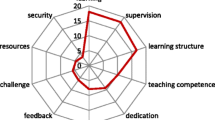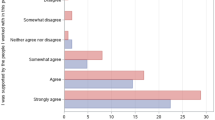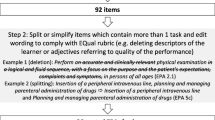Abstract
Background
Postgraduate medical training in Ireland has been compared unfavourably with training abroad and blamed for an “exodus” of graduates of Irish medical schools. Exploration of features of a good training environment and development of tools to measure it have been the focus of much published research. There have been no Irish studies examining training environment using such validated tools.
Aim
The aim of this study was to use a validated tool, to examine the expectations and experience of training, amongst those training under the Royal College of Physicians of Ireland (RCPI).
Method
The Dutch Residency Education Climate Test (D-RECT) is a 50 item tool to measure postgraduate learning environments. D-RECT was sent to all new entrants to RCPI training programmes in July 2012 (n = 527) and completed in regard to expectations of training (response rate 80.6 %). In March 2013, D-RECT was sent to all RCPI trainees (n = 1,246) to complete in relation to the post held on 1 March (response rate 32.6 %). Data were analysed in SPSS version 18.
Results
Experience fell short of expectations for basic specialist training, however, scores for experience rose with greater seniority to match expectations. Positive aspects were teamwork, consultant willingness to discuss patients and respectful treatment of trainees. Areas of weakness were provision of feedback and time to learn new skills.
Conclusion
Measurement of learning environment at a national level using a quantitative tool provides useful information for quality assurance and improvement of training.
Similar content being viewed by others
References
Buttimer J (2006) Preparing Ireland’s doctors to meet the health needs of the 21st century. Postgraduate Medical Education and Training Group, Dublin
Bruce-Brand R, Broderick J, Ong J, O’Byrne J (2012) Diagnosing the doctors departure : survey on sources of dissatisfaction among Irish junior doctors. Ir Med J 105:15–18
Burke C (2012) Survey of final year medical students 2012: will we go or will we stay? Dublin, Ireland
Finucane P, O’Dowd T (2004) The career plans of Irish interns: results of a national survey. Ir Med J 97:149
McEntee E, Daly L, Clarke A, Fitzpatrick P (2005) Career Tracking Study. Factors affecting career choices and retention of Irish medical graduates. Dublin, Ireland
O’Sullivan KE, Byrne JS, Walsh TN (2013) Basic surgical training in Ireland: the impact of operative experience, training program allocation and mentorship on trainee satisfaction. Ir J Med Sci. doi:10.1007/s11845-013-0956-4
Kelly MO, Kelly FO, Ciardha DÓ (2012) A national survey of GP trainees 2012. Dublin, Ireland
HSE-MET (2012) Implementation of the reform of the intern year second interim report. pp 1–72
Fitzgerald MX (2007) Medical education training and research. HSE strategy. Health Service Executive, Dublin
Medical Council (2013) Medical education, training and practice in Ireland 2008–2013. A progress report. Dublin, Ireland
GMC (2013) National Training Survey 2013. London
Eraut M (2008) Learning from other people in the workplace. In: Hall K, Murphy P, Soler J (eds) Pedagogical practice culture identities. Oxford University Press, London, pp 40–57
Kearns L (2007) National audit of SHO and registrar posts. Dublin, Ireland
Isba R, Boor K (2011) Creating a learning environment. In: Dornan T, Mann KV, Scherpbier A, Spencer J (eds) Medical education: theory and practice. Churchill Livingstone, London, pp 99–114
Roff S, McAleer S (2001) What is educational climate? Med Teach 23:333–334. doi:10.1080/01421590120063312
Dornan T, Muijtjens A, Graham J et al (2012) Manchester clinical placement index (MCPI). Conditions for medical students’ learning in hospital and community placements. Adv Health Sci Educ Theory Pract 17:703–716. doi:10.1007/s10459-011-9344-x
Roff S (2005) The Dundee ready educational environment measure (DREEM)—a generic instrument for measuring students’ perceptions of undergraduate health professions curricula. Med Teach 27:322–325. doi:10.1080/01421590500151054
Roff S, McAleer S, Harden RM et al (1997) Development and validation of the Dundee ready education environment measure (DREEM). Med Teach 19:295–299. doi:10.3109/01421599709034208
Mayya S, Roff S (2004) Students’ perceptions of educational environment: a comparison of academic achievers and under-achievers at Kasturba Medical College, India. Educ Heal Chang Learn Pract (Taylor Fr Ltd) 17:280–291. doi:10.1080/13576280400002445
Al-Hazimi A, Al-Hyiani A, Roff S (2004) Perceptions of the educational environment of the medical school in king Abdul Aziz University, Saudi Arabia. Med Teach 26:570–573. doi:10.1080/01421590410001711625
Till H (2005) Climate studies: can students’ perceptions of the ideal educational environment be of use for institutional planning and resource utilization? Med Teach 27:332–337. doi:10.1080/01421590400029723
Soemantri D, Herrera C, Riquelme A (2010) Measuring the educational environment in health professions studies: a systematic review. Med Teach 32:947–952. doi:10.3109/01421591003686229
Kelly M, Bennett D, O’Flynn S (2012) General practice––the DREEM attachment? Comparing the educational environment of hospital and general practice placements. Educ Prim Care 23(1):34–40
Bennett D, Kelly M, O’Flynn S (2010) Are the bigger hospitals better: DREEM on? Ir J Med Sci 179:515–519. doi:10.1007/s11845-010-0551-x
Roff S, McAleer S, Skinner A (2005) Development and validation of an instrument to measure the postgraduate clinical learning and teaching educational environment for hospital-based junior doctors in the UK. Med Teach 27:326–331. doi:10.1080/01421590500150874
Boor K, Van Der Vleuten C, Teunissen P et al (2011) Development and analysis of D-RECT, an instrument measuring residents’ learning climate. Med Teach 33:820–827. doi:10.3109/0142159X.2010.541533
Lave J, Wenger E (1991) Situated learning: legitimate peripheral participation. Cambridge University Press, Cambridge
Royal College of Physicians of Ireland, Royal College of Surgeons of Ireland, Institute of Obstetricians and Gynaecologists of Ireland (2011) Submission to the Joint Committee on Health and Children, Houses of the Oireachtas. Dublin, Ireland
Temple J (2010) Time for training. A review of the impact of the European working time directive on the quality of training, Medical Education England. London, UK
Bury G (2011) Annual assessment of NCHD posts July 2011 to June 2012. Medical Education and Training Unit, Dublin
Billett S (2006) Relational interdependence between social and individual agency in work and working life. Mind Cult Act 13:53–69. doi:10.1207/s15327884mca1301_5
Yardley S, Teunissen PW, Dornan T (2012) Experiential learning: AMEE guide no. 63. Med Teach 34:e102–e115. doi:10.3109/0142159X.2012.650741
Vieira JE (2008) The postgraduate hospital educational environment measure (PHEEM) questionnaire identifies quality of instruction as a key factor predicting academic achievement. Clinics 63:741–746. doi:10.1590/S1807-59322008000600006
Aspegren K, Bastholt L, Bested KM et al (2007) Validation of the PHEEM instrument in a Danish hospital setting. Med Teach 29:498–500. doi:10.1080/01421590701477357
Cook JV, Dickinson HO, Eccles MP (2009) Response rates in postal surveys of healthcare professionals between 1996 and 2005: an observational study. BMC Health Serv Res 9:160. doi:10.1186/1472-6963-9-160
Baruch Y, Holtom BC (2008) Survey response rate levels and trends in organizational research. Hum Relations 61:1139–1160. doi:10.1177/0018726708094863
Halbesleben JRB, Whitman MV (2013) Evaluating survey quality in health services research: a decision framework for assessing nonresponse bias. Health Serv Res 48:913–930. doi:10.1111/1475-6773.12002
Peadon E, Caldwell PHY, Oldmeadow W (2010) “I enjoy teaching but…”: Paediatricians’ attitudes to teaching. J Paediatr Child Health 46:647–652. doi:10.1111/j.1440-1754.2010.01823.x
Mortensen L, Malling B, Ringsted C, Rubak S (2010) What is the impact of a national postgraduate medical specialist education reform on the daily clinical training 3.5 years after implementation? A questionnaire survey. BMC Med Educ 10:46. doi:10.1186/1472-6920-10-46
Acknowledgments
This study was funded by the Royal College of Physicians of Ireland. We would like to thank the many RCPI trainees who responded to the study questionnaires, the administrative staff of the RCPI for their assistance and, in particular, Gillian Walsh, Lisa Walsh, Ciara Hudson and Sophia Kilcullen.
Author information
Authors and Affiliations
Corresponding author
Rights and permissions
About this article
Cite this article
Bennett, D., Dornan, T., Bergin, C. et al. Postgraduate training in Ireland: expectations and experience. Ir J Med Sci 183, 611–620 (2014). https://doi.org/10.1007/s11845-013-1060-5
Received:
Accepted:
Published:
Issue Date:
DOI: https://doi.org/10.1007/s11845-013-1060-5




